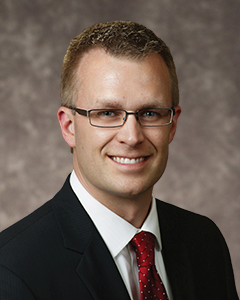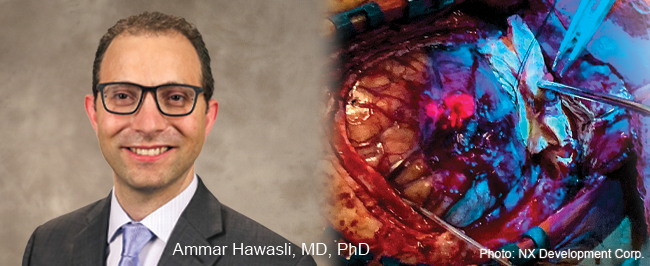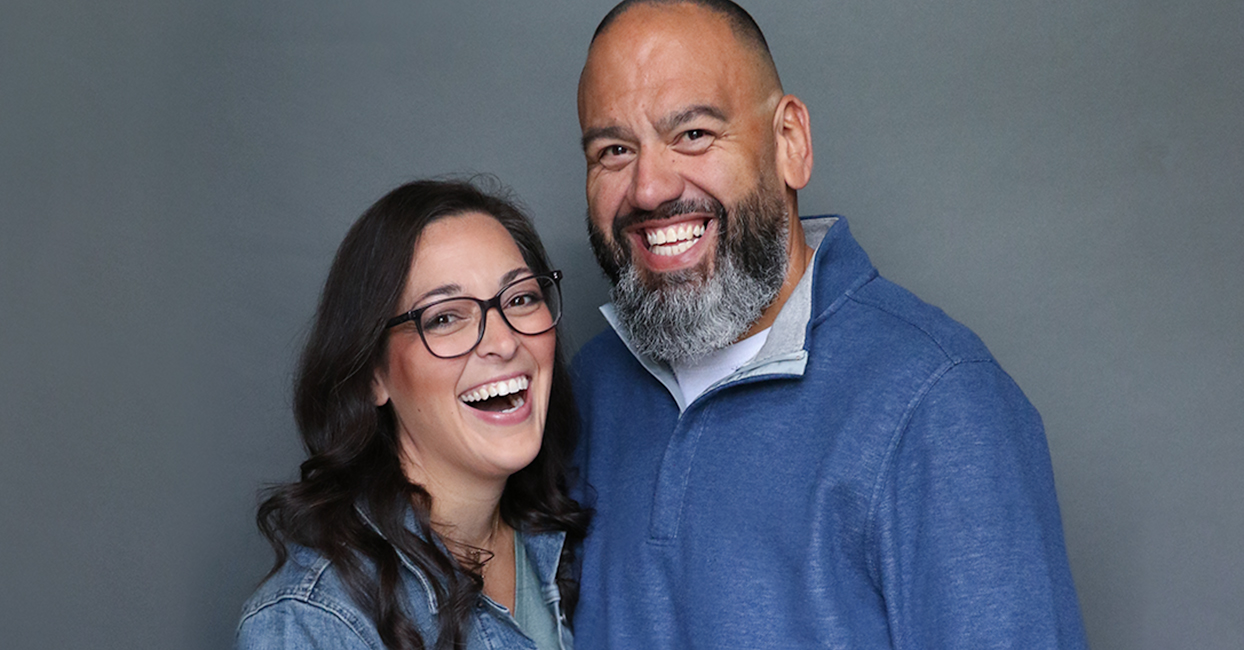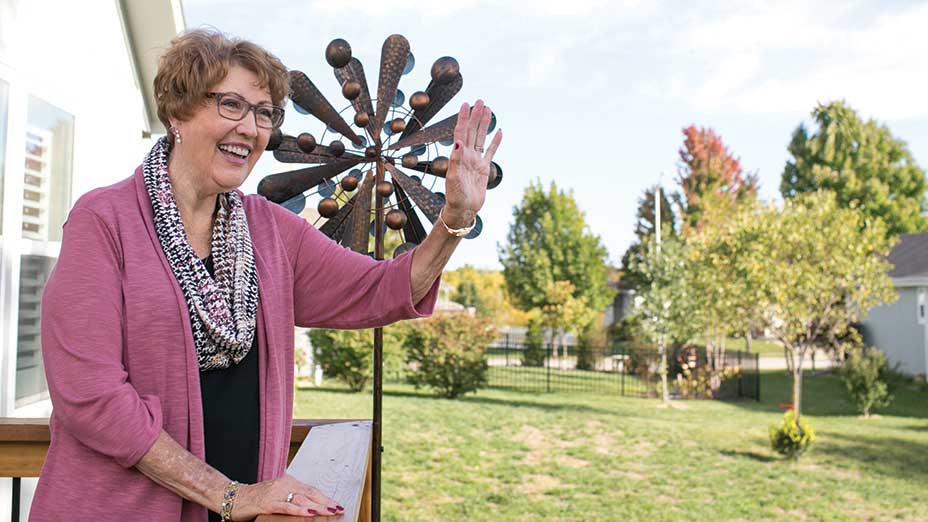Tim Baldwin’s determination to achieve anything he sets his mind to is remarkable. He believes he was born to be a teacher. At 16 years old, he discovered a passion for speech and debate, inspiring him to become a debate coach at Liberty High School. After his dreams came to fruition, he made his job his top priority, allowing his health and well-being to take a back seat.
When Tim ended up in the Intensive Care Unit at North Kansas City Hospital with a heart failure diagnosis, he knew he needed to shift his priorities.
“How you balance your work and life determines how healthy you are,” Tim, 36, said. “I let my work take over my entire life. I stopped taking care of myself and going to the doctor. My willingness to sacrifice my health for my job nearly did me in.”
Reality Check
Health Expert

Drew Allen, DO
Learn more at MeritasHealth.com/DAllen.
Congestive heart failure (CHF) occurs when the heart cannot pump enough blood to meet the body’s demands. The risk of developing CHF increases by being inactive, eating high-fat foods and smoking, all of which describe Tim’s prediagnosis habits. Most cases of CHF develop slowly over time, but, like in Tim’s case, worrisome symptoms can appear out of the blue.
“When I took a trip to Yosemite National Park with my wife, I realized something was wrong,” said Tim. “I couldn’t walk more than 100 yards because my stomach hurt, I kept coughing and couldn’t catch my breath.”
When Tim and his wife, Marie, returned home, Tim’s health worsened. He was losing sleep, retaining water and struggling to breathe.
“If you haven’t been to the doctor in years, you’re afraid to confront reality,” Tim said.
With his wife’s encouragement, Tim to the NKCH Emergency Room and was immediately admitted with acute congestive heart failure. His vitals were dangerously high, with a blood pressure of 260/140 mmHg. A healthy blood pressure is 120/80 mmHg or lower.
“You could see the swelling in his legs and his shortness of breath,” said Drew Allen, DO, Cardiac Rehabilitation medical director and board-certified cardiologist with Meritas Health Cardiology. “When you walk in and see someone like that, you know you have to get to work because he was so ill.”
Tim, who weighed more than 380 pounds, was transferred to the ICU, where Dr. Allen and the care team helped Tim stay positive. They helped him build a plan with important lifestyle changes to improve his health and well-being.
“Everyone at NKCH and MH helps you believe in yourself.” – Tim Baldwin
The work began before Tim left the hospital. He asked Dr. Allen what he could do to make a change, and he suggested Tim walk laps around the unit. His determination to be healthier astounded his care team.
“Rarely do I see someone as enthusiastic as Tim,” Dr. Allen said. "He embraced everything and moved forward in a determined fashion to make changes. He’s a wonderful source of motivation for everyone.”


Healthy Choices
Tim only spent four days in the hospital, but it changed how he viewed life. He realized choosing to be healthy over being unhealthy was better for him.
“When I switched to making healthy choices, it was simple,” Time said. “Every day I felt a little bit better instead of worse. Long-term, that’s an incredible feeling.”
Tim now pays more attention to what he puts in his body, prioritizing healthy eating and not smoking. He walks 6 miles or more every day. These changes have greatly impacted his energy and self-esteem.
“I feel like a different person. I have more confidence and energy, which has helped me change how I move through my days,” Tim said.
Unmatched Support
Tim’s drive to improve his health made a big difference. He attributes his success to the support he received from his wife, mother, and NKCH and MH’s care team.
“Everyone at NKCH and MH helps you believe in yourself,” Tim said. “They believe and invest in their patients. I think that investment made all the difference in my journey.”
Take Heed to Heart Disease
Staggering Statistics
Heart disease is the leading cause of death and hospitalization in the U.S.
- 1 in 3 adults has at least one type of heart disease.
- 1 in 5 deaths are caused by heart disease.
- Someone dies every 34 seconds from heart disease.
- Someone has a heart attack every 40 seconds.
- 6 million Americans have heart failure.
While many think heart disease only affects people in their 50s and older, more adults under age 40, like Tim, develop heart-related conditions. Much of this comes from increasing rates of health problems and unhealthy habits that put younger people at a higher risk of heart disease.
Risk Factors
- High blood pressure or cholesterol
- Inactive lifestyle
- Overweight or obese
- Tobacco product use
- Unhealthy diet
Schedule a Heart Scan
Find out if you’re at risk for heart disease with a 15-minute calcium scoring cardio scan or heart scan. If you have high blood pressure, high cholesterol or a family history of early heart disease, talk with your doctor about scheduling your appointment to test your ticker.
Care You Can Count On
Get advanced heart care and feel confident you’re getting the best care from our specialists for a wide range of services and treatments, including:
- Cardiac rehabilitation
- Diagnostic testing
- Fast cardiac emergency treatment
- Heart surgeries and procedures
- Nonsurgical treatments
- Preventative care
Related Articles

March 9, 2020
3 Sneaky IBS Triggers
For people with irritable bowel syndrome, spring may spark a flare-up in symptoms

May 31, 2024
5 Nutrition Tips for a Healthier Lifestyle
Healthy eating and proper nutrition play a big part in maintaining good health. Here's how to improve your nutrition habits.

July 8, 2021
5-ALA Fluorescence Guides Neurosurgeons for More Complete Resections
Neurosurgeons Ammar Hawasli, MD, PhD, and Stephen Reintjes Jr., MD, with Meritas Health Neurosurgery, are now using a progressive treatment that allows for the more precise removal of malignant gliomas and glioblastomas.


